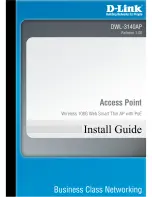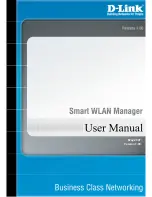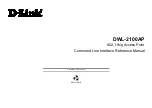
2
Step Two: Connect the 802.11g Wireless Turbo Multi-function Access Point
•
Use the Ethernet port and an RJ-45 cable to connect the 802.11g Wireless Turbo Multi-func-
tion Access Point to one of the following devices: a cable or DSL modem with routing capa-
bilities, a hub, a bridge, an existing Ethernet LAN, or a router.
•
Attach both antennas to the 802.11g Wireless Turbo Multi-function Access Point.
•
Attach the power supply to the Wireless Access Point and to a power outlet.
The Wireless Access Point has three LED status indicators: PWR, TX/RX, and WARN. When the
Wireless Access Point is plugged in, the PWR LED will be illuminated. When a network connection
is established, the TX/RX LED will be illuminated. If an unauthorized user attempts to use the
802.11g Wireless Turbo Multi-function Access Point, the WARN LED will be illuminated.
Step Three: Verify detection of the 802.11g Wireless Turbo Multi-function
Access Point
After the Wireless Access Point is installed, double-click the icon for the Configuration Utility on
your desktop. If the 802.11g Wireless Turbo Multi-function Access Point is located, the configura-
tion information will be displayed.
Note:
It is recommended that the 802.11g Wireless Turbo Multi-function Access Point is
always configured via an Ethernet connection. This will ensure the configuration changes
are made without modifying the properties of any wireless cards in your network.
To verify that you are connecting to the correct Wireless Access Point, check the MAC address.
The MAC address is located on the bottom of the 802.11g Wireless Turbo Multi-function Access
Point case and in the Link Information option of the Configuration Utility.
When you have identified the correct Wireless Access Point, note the IP address that is listed.
Launch a Web browser on the computer that is physically connected to the 802.11g Wireless
Turbo Multi-function Access Point. Enter the IP address for your Wireless Access Point. This will
open the Web Configuration Utility. The default user name is
admin
. There is no default pass-
word.







































